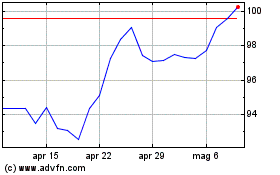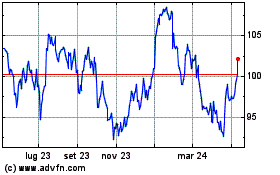By Denise Roland and Tom Burton
This article is being republished as part of our daily
reproduction of WSJ.com articles that also appeared in the U.S.
print edition of The Wall Street Journal (August 19, 2019).
Novartis AG Chief Executive Vas Narasimhan has spent part of his
18 months at the helm of the drug giant cleaning up issues that
emerged before his watch. Now, he is facing a storm of his own
making.
Dr. Narasimhan said on a call with analysts earlier this month
that the company kept a data-manipulation issue under wraps while
the Food and Drug Administration completed its review of Novartis's
Zolgensma, the world's most expensive drug. The Swiss company has
said it wanted to finish its own review before alerting the FDA,
which it eventually did.
That timeline, however, has now triggered scrutiny by the
regulator and drawn the ire of a handful of prominent politicians,
casting a shadow over Dr. Narasimhan's short tenure as CEO.
"He's certainly in big danger of losing credibility," said Brad
Loncar, an investor who runs an exchange-traded fund of biotech
companies. "They've handled this in just about the worst way
possible." Mr. Loncar doesn't own shares in Novartis.
The FDA has referred the Zolgensma matter to its Office of
Criminal Investigations to begin a preliminary inquiry, according
to a person familiar with the events. Submitting false data to the
agency as part of a new-drug application could be a crime if
investigators prove the actions were intentional and not an
oversight.
Novartis says it hasn't been notified of the referral. The FDA
declined to comment.
"Submitting complete information to the FDA is sacrosanct to the
agency, " said David Gortler, a former FDA official.
The manipulation occurred at AveXis, a separate company that
developed the drug and that Novartis later bought. Dr. Narasimhan
has said that the lag in telling the FDA about the issue was
unrelated to the approval timeline for Zolgensma. Novartis has said
those responsible for the manipulation are being ousted.
"We tried to do all of the right things," Dr. Narasimhan said on
the analyst call. He declined to comment for this article.
The episode is especially testing for Dr. Narasimhan because he
has made it his goal to rebuild trust in the company. One of his
first tests as CEO was handling the revelation that Novartis paid
$1.2 million to Michael Cohen, President Trump's former personal
lawyer, for what the company called insight into the
administration's health-care policy. He called the decision --
which was made before he became CEO and in which he says he wasn't
involved -- a mistake.
He is also presiding over negotiations with the U.S. to settle a
long-running lawsuit alleging Novartis treated doctors to lavish
dinners and other events in return for boosting prescriptions. The
company recently set aside $700 million for a settlement.
Dr. Narasimhan, a 42-year-old Harvard-educated medical doctor,
made a splash at Novartis after taking the top job. He promised a
technology-led reboot of the company's research and development and
moved quickly to shed lower-growth businesses.
Shares in July hit their highest level since 2015, though they
have retreated somewhat since. After the data manipulation issue
was disclosed by the FDA earlier this month, shares fell 2.5%.
Dr. Narasimhan is deeply invested in the success of Zolgensma,
which forms a pillar of his strategy to pivot the company toward
cutting-edge medicines. The $8.7 billion acquisition of AveXis,
which developed Zolgensma and where the manipulation occurred, was
one of his first big bets as CEO.
The drug is one of the first gene therapies to go on sale in the
U.S., but it has also attracted scrutiny for its price tag -- at
$2.1 million for the one-time treatment. It treats spinal muscular
atrophy in small children by providing a working version of the
faulty gene that causes the condition.
According to Novartis's account of the data manipulation, the
issue was first raised internally in March. Dr. Narasimhan learned
about the issue in early May, he told analysts on the call.
That data -- although a small set -- formed part of the dossier
submitted to the FDA to seek approval for the drug. Dr. Narasimhan
said he decided to run an internal investigation to determine
whether the FDA file needed an update.
Weeks later, on June 28, Novartis told the FDA, which by then
had approved the therapy. The agency has said the treatment can
stay on the market since the issue doesn't change its view that
Zolgensma is safe and effective.
The disclosure has caused a firestorm in Washington, at a time
when drug prices have become a hot-button political issue. Five
senators, including Democratic presidential candidates Sens.
Elizabeth Warren of Massachusetts and Bernie Sanders of Vermont,
recently wrote a letter to the FDA, urging the agency to make a
forceful response to Novartis.
Separately, Sen. Chuck Grassley (R., Iowa) wrote to Dr.
Narasimhan demanding information about the decision-making process
and calling the episode reprehensible.
FDA officials are expected to meet congressional staff to
discuss the issue in the coming week, according to an agency
official.
Write to Denise Roland at Denise.Roland@wsj.com and Tom Burton
at tom.burton@wsj.com
(END) Dow Jones Newswires
August 19, 2019 02:47 ET (06:47 GMT)
Copyright (c) 2019 Dow Jones & Company, Inc.
Grafico Azioni Novartis (NYSE:NVS)
Storico
Da Mar 2024 a Apr 2024

Grafico Azioni Novartis (NYSE:NVS)
Storico
Da Apr 2023 a Apr 2024
